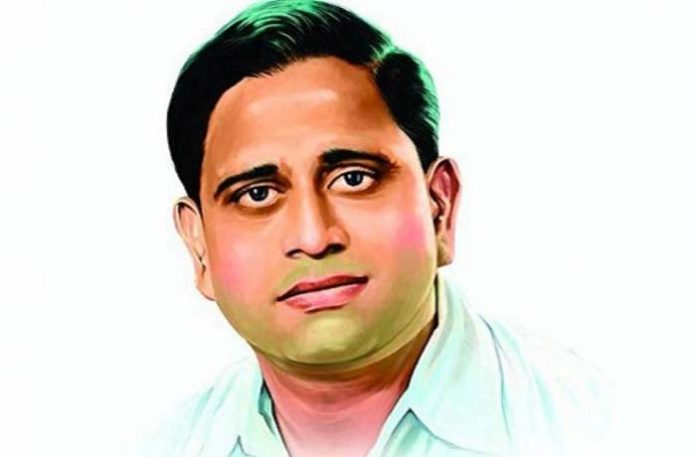(December 4, is Ghantasala’s Birth Anniversary. Jai Kumar from London eulogizes his sublime voice.)
When Ghantasala sang his first song in the film Swargaseema, Oh Nah Raaja, in 1945, few would have imagined that here was a voice that would dominate Telugu film music for the next quarter century. Recipient of the Padmashri, this beloved son of the Telugu world sang over 10,000 songs, and composed for over a hundred films.
Ghantasala’s name is synonymous with the sonorous yet supremely melodious Telugu music. His voice is the gift of God. A gift that voiced the sweetest songs that tell of our saddest and and happiest thoughts and feelings. A gift that the Telugu people a11 over the world have been cherishing with admiration, love and respect for years- till now and, for sure, for years that follow.
Majestic voice
A vocalist of infinite variety, a composer of creative depth, a scholar of classical music and a human being of humility and compassion, Ghantasala achieved the finest artistic glory not only with his film songs but also with his non-film renditions. As V.A.K Ranga Rao, musicologist, and critic who knew Ghantasala, said: “It’s no exaggeration to say that Ghantasala’s voice is the most majestic voice in India.”
For more than twenty five years, Ghantasala devoted himself to singing and creating some of the greatest songs which, in fact, have enormously contributed to the box-office success of a number of Telugu films particularly in the 50s and the 60’s. It was the golden era of Telugu cinema when stalwarts like N T Rama Rao and Akkineni Nageswara Rao strode the Telugu celluloid like histrionic giants. Ghantasala managed to sing for both matinee idols, varying his style and tenor to match the screen charisma of these great actors.
A family of musicians
Music came naturally to Ghantasala. Born into a family of musicians on December 4, 1922 in Gudivada, Andhra Pradesh (AP), Ghantasala Venkateswara Rao had, for his guide and guru, his father Ghantasala Soorayya, a noted Mridangam exponent. Deriving inspiration from his father, the young boy became a practiced exponent of tarangas, a traditional dance form of Andhra, and earned the title of Bala Bharati. He was a child actor in plays like Chintamani and Sant Sakkubai, and used to sing while dancing, accompanied on the mridangam by his father.
Jailed during Quit India movement
At the tender age of eleven, Ghantasala’s muse and inspiration, his father, died. But bearing his father’s words in mind, he was determined to pursue musical education at any cost and joined Vijayanagaram Music College in AP, where he learnt Sanskrit as well as classical music. But after graduating, Ghantasala, was thrown into the freedom struggle and was jailed for eighteen months for participating in the Quit India movement.
The release from prison brought him another commitment- that of marriage. And marriage brought about a professional break from Samudrala Raghavacharyulu, a well known script writer and song composer from Ghantasala’s mother-in-law’s village, who introduced him to the world of films.
Debut in Swargaseema
Ghantasala made his debut in the film Swargaseema in 1945. The rest is history. Music directors and film producers recognized the potential of his powerful voice, and hits like Balaraju and Devadasu followed. He had the rare opportunity, at the time, of working with some of the biggest talents of Telugu cinema: Lyricists like Samudrala Sr., Tapi Dharma Rao, Balijepalli; composers like C.R.Subburaman and Ogirala; and singers like P.Bhanumathi and Krishnaveni.
Melodic subtleties
Ghantasala himself is a talented composer. The most distinctive quality of Ghantasala’s singing is his clarity of expression. As a full-fledged poet and scholar, he is clearly aware of the nuances of Telugu language. He observed a sweet, slow pace in his renditions. Perhaps the most loved and admirable quality of his singing is that he never hurries when rendering a song. He takes his time thus bringing out the melodic subtleties of the raags, poetry and music, of which he is a master. That is why we always call him Master Gaaru.
Ghantasala sometimes gets too involved emotionally in some sad songs- his voice veering towards being over sentimental; but in most of his sad songs he exudes a delectable detachment while rendering- in songs like Siva Shankaree, Raave Naa Cheliya, Challani Vennelalo, Manavi Seyave, Jagame Maarinadhi, Jagame Maya and more.
His music, songs and poems crystallise the very essence of being human: in devotion to God, when in love with a woman, when being with children, and when alone. Ghantasala has enriched Telugu culture enormously through his music. His songs, as Dr. Akkineni Nageswara Rao said, will be admired, loved and enjoyed for ever. And we express our supreme gratitude in salutation to Ghantasala’s sublime voice.
(Those who love Ghantasala and his songs may tune in Sakalam channel from 6 pm to 10 pm on December 5, Saturday ,for a live show of Dr. Rahmatullah’s ‘Ghantasala Gaanaavadhaanam’ organised by Nava Sahiti International. Click on the link below to view)



